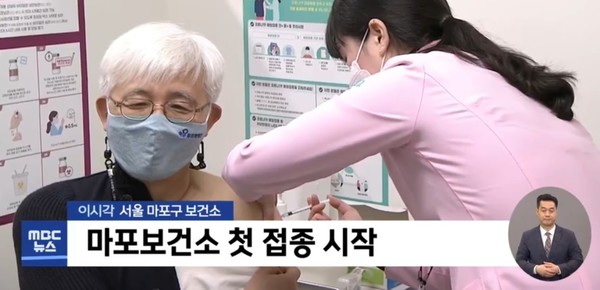Korea started its Covid-19 vaccine inoculation program on Friday, marking the first step of the country's long-awaited return to everyday life before the pandemic.

The government will inoculate 5,226 medical workers and patients under 65 at 213 nursing facilities with the AstraZeneca vaccine on Friday. Nursing facility residents and workers can receive vaccinations at public health centers. Medical professionals will also visit nursing homes to give jabs to people less mobile.
About 290 nursing hospitals will also start vaccination according to their respective plans.
Among the first vaccination batch targets, 289,000 people at 4,146 nursing facilities and hospitals have agreed to receive the vaccination, with the rate of consent for vaccination at 93.7 percent. Health officials plan to use the entire first vaccination batch throughout March.
The Korea Disease Control and Prevention Agency said it would announce vaccination numbers later in the day.
Starting Saturday, medical workers treating Covid-19 patients will get injections with the Pfizer vaccine at the National Medical Center’s Central Vaccination Center in Jung-gu, Seoul.
Health authorities plan to complete inoculations on 55,000 medical staff treating Covid-19 patients with Pfizer products' first batch by March 20, while authorities expect to start the second batch of vaccination from April 10.
"The vaccines used in the inoculation program have received approval after a thorough triple verification procedure of the Ministry of Food and Drug Safety or approval for use after verification of safety and efficacy by World Health Organization (WHO)," KCDA Commissioner Jeong Eun-kyeong said. "The vaccines are also already used worldwide to inoculate many people."
To achieve herd immunity, the government asks the public to receive the jabs actively when their turn comes around, she added.
Despite the vaccine rollout, the government decided to extend the current social distancing scheme for another two weeks as cluster Covid-19 infections continue to pop up across the country. Officials have also retained the ban on the gatherings of five or more people nationwide except for immediate family members.
"The current situation is that the third viral wave has not calmed down," Prime Minister Chung Sye-kyun said during a daily task force meeting. "While the nation did not see a rapid spread of Covid-19 virus tied to the Lunar New Year holiday, sporadic group infections continue at workplaces, hospitals, and family gatherings.
The virus reproduction index is also hovering above 1.0 for two weeks in a row, he added. The reproduction index shows the number of people a patient can transmit the virus on average. If the index rises above 1, it gets difficult for epidemiological investigations or quarantine responses to keep up with the virus's spread.
Chung stressed that while the long-awaited vaccination has taken its first steps, the nation still has to go a long way before reaching herd immunity.
"If the virus resurges again before most people get the vaccine, medical resources may become scarce," he said. "When anxiety increases due to the spread of infection, social conflict surrounding vaccination priority can intensify."
The KDCA confirmed 406 new patients, including 382 local infections, on Friday, up from 396 on Thursday. The cumulative caseload rose to 88,922 as of midnight Thursday. Imported cases decreased to 24 from 27.
The death toll stayed at a single-digit figure as the KCDA reported four more fatalities, pushing the death toll to 1,585 with a fatality rate of 1.78 percent. An additional 393 patients fully recovered and returned to their everyday lives, increasing the total to 79,880. The country has tested 6,590,066 people since Jan. 3 last year.

